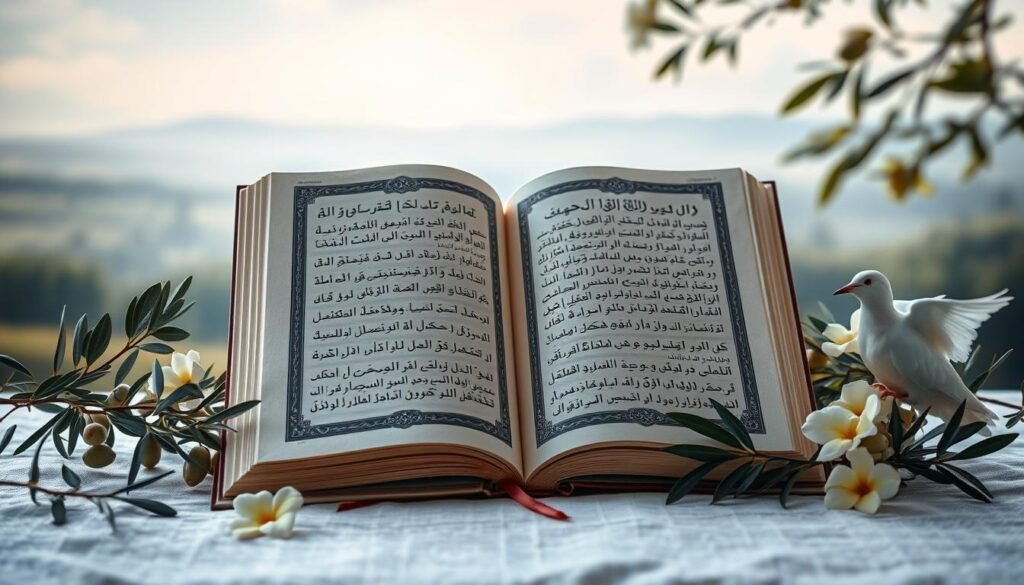Have you ever thought about how culture and religion affect our view of murder? What Does The Quran Say About Murder? The Quran, a key text for over a billion Muslims, sheds light on the value of life and the serious consequences of taking a life. It sees murder as more than violence; it’s against God’s law, harming humanity itself.
The Quran teaches that every life is precious. It says killing one person is like killing all of humanity. This message shows the deep wrong of murder and our duty to protect and respect life. By looking into the Quran’s teachings on murder, we see a moral guide that goes beyond rules. It encourages us to think about justice, compassion, and how to make things right.
The Sacredness of Life in Islam
In Islam, the idea of sacred life is very important. It shows how much life is valued in the faith. The Quran teaches us to protect and respect all life. This view creates a culture of kindness and shows the deep dignity of every person.
The Importance of Preservation of Life
Islamic teachings say taking an innocent life is a big sin. Quran 5:32 says killing one person is like killing everyone. This shows Muslims must value and protect every life. In wars, Prophet Muhammad said to leave non-fighters like women, kids, and the elderly alone. This shows how precious life is, even in hard times.
Islamic Teachings on Respecting Life
Islamic teachings stress the need to respect and be kind to all life. The Quran and Sunnah teach us to be understanding and kind. They encourage building relationships on respect. Also, the religion values justice and peace, telling believers to respect everyone’s dignity, no matter their beliefs.
These teachings show that in Islam, we must do our best to protect the sacred life given to us.
Quranic Verses Addressing Murder
The Quran teaches us a lot about killing and its serious effects. It clearly says that taking an innocent life is wrong. These teachings guide us on how to think and act when it comes to murder.
Key Verses on Killing
Some Quranic verses talk about the value of human life. For example, Surah Al-Ma’idah (5:32) says killing one person is like killing everyone. Surah Al-Isra (17:33) also tells us not to kill on purpose. These Quranic verses teach us that murder is a big deal.
Interpretations of Relevant Verses
Scholars see these verses as strict rules for killing someone on purpose. They say that if someone is killed, the killer might face the same fate. This is called Qisas. They also talk about treating prisoners fairly and following the law, not taking the law into our own hands.
This leads to talks on how to be just and ethical in society. It’s like what’s said in the broader discussions on murder consequences in the Quran.

What Does The Quran Say About Murder
The Quran clearly talks about murder, showing how serious it is. It tells us that taking a life is a big deal. It teaches us to value life a lot.
It gives rules and what happens if we break them. It tells us to protect our own life and others too.
Explicit Condemnations of Homicide
The Quran strongly says no to murder. It says every life is precious. Taking a life without a good reason is a huge sin.
Doing so leads to big trouble in this life and the next. The Quran makes it clear that every life is sacred. It tells us not to take life lightly.
The Context of Human Life in Islam
In Islam, human life is very important. The Quran guides us on how to live with each other. It teaches us to be kind and help our communities.
It tells us to look out for each other and our society. This helps shape who Muslims are and what they should do for others.
Intentional vs. Unintentional Killing
In Islamic law, the difference between intentional and unintentional killing is crucial. Taking a life without a good reason is a serious offense. The Quran says such actions lead to eternal punishment in Hell and divine wrath.
This is clear in Surah an-Nisa’ 4:93, which outlines punishments for those who commit this sin.
Differences in Punishment
Islamic law treats intentional and unintentional killing differently. If someone intentionally kills another, they face severe punishment, possibly even death. But if it was unintentional, the punishment is lighter.
This includes paying the victim’s family, called diyah, or doing a specific penance. This approach shows justice while allowing for forgiveness.
Expiation and Exoneration for Manslaughter
Expiation is key in cases of manslaughter. If an unintentional killing happens, the victim’s family can choose forgiveness or compensation. This approach promotes forgiveness and healing.
Islamic teachings say seeking forgiveness can clear one’s name. This shows the value of accountability and regret. These rules aim to maintain social balance, highlighting life’s sacredness in the Quran and Sunnah.
The Concept of Qisas (Retribution)
Qisas is a key idea in Islamic law. It deals with serious crimes like murder through retribution. This lets the victim’s family seek justice against the criminal. Countries like Afghanistan, Iran, Pakistan, Saudi Arabia, the United Arab Emirates, and Qatar use Qisas for justice and community peace.
Understanding Qisas in Islamic Law
“Qisas” is linked to the old idea of “an eye for an eye.” The Quran clearly outlines how to punish murder, focusing on fair punishment. Victims’ families can demand justice under Qisas, showing their big role in Islamic justice. They can also choose money compensation (diyya) instead, showing two ways to solve justice.
Applications and Limits of Qisas
Qisas has limits to keep society peaceful and stop too much revenge. It supports personal responsibility but also encourages making peace between families. The law sees different types of murder, like intentional or unintentional ones. Some murders get strict justice, but others might get settled with money instead.
This way, justice does more than just punish. It helps fix the community’s balance.
You may also be interested in:
Islamic Perspective on Self-Defense
Islam sees self-defense as key under certain conditions. It lets people protect themselves when their lives are at risk. This fits with Islamic law’s ethical rules, which see self-defense as a justified way to fight back against an attack. The main idea is to act right when facing a threat.
Conditions for Justifiable Self-Defense
Islamic law says self-defense is okay when there’s a real threat to your life. This shows the deep moral values in Islam, calling for balance and fairness. About 33.33% of the Quran talks about using force to protect oneself, showing it’s allowed.
This rule started in 622 AD, marking a big change in Islamic history.
Prohibitions Against Excessive Force
Self-defense is allowed, but using too much force is not. Islamic teachings say any defense must match the attack. This rule helps keep life sacred, even when defending oneself. The Quran reminds us that the goal of self-defense is to stop harm, not to start more violence.

Legal Consequences of Murder in Islam
Murder in Islamic law is taken very seriously. It’s all about keeping the community safe and ensuring justice. The punishment for murder is strict to stop violence and keep peace in the Islamic world. This means the legal outcome for killing someone is often very severe, like death or harsh punishment.
Punishments for Intentionally Killing
In Islamic law, killing someone on purpose is seen as a huge sin. The Quran says killing an innocent person is like killing all of humanity. This shows how serious it is. Because of this, the law in Islamic countries often calls for the death penalty for murder.
Some countries use methods like lethal stoning or beheading for this. These punishments are used more often in some places than others.
Impact on the Community and Faith
Murder affects not just the person who was killed but the whole Islamic community too. It breaks social unity and questions the moral values of Islam. Communities struggle with the idea of justice and being responsible for their actions.
Teaching people about the legal outcomes of murder helps. It builds a culture that values life and takes responsibility. This keeps the true values of Islam alive.
Compassion and Forgiveness in Response to Murder
Islamic law clearly says murder is wrong. But it also teaches us about compassion and forgiveness. Many stories show families of victims choosing to forgive instead of seeking revenge. This helps heal communities and brings peace.
These stories show how mercy can change lives. They also talk about the spiritual benefits of forgiving. This creates a space for healing and making peace.
Stories from Islamic History
History is full of stories about forgiveness. These stories prove Islam’s teachings on mercy. After big events like the conquest of Mecca, forgiveness turned enemies into friends.
These stories make us think about our actions and how they affect our relationship with God. They show the power of choosing compassion over revenge.
Hadith on Forgiveness and Mercy
The Hadith also talk about the importance of forgiveness and mercy. They say forgiving others can bring us closer to God. The Qur’an mentions ‘forgive’ 35 times, showing how crucial mercy is.
These teachings suggest we can understand and forgive even the most difficult actions. This approach leads to personal and community peace. For more on this topic, visit this source.
FAQ
What does the Quran say about the consequences of murder?
How does the Quran emphasize the sanctity of life?
What are the differences between intentional and unintentional killing in Islamic law?
What role does Qisas play in the context of murder?
Is self-defense considered valid in Islam?
How are the impacts of murder felt within the Muslim community?
What teachings promote compassion and forgiveness in the case of murder?

Embracing Faith, One Insight at a Time!
The teachings of the Quran have always guided my path. With a deep passion for Islamic knowledge, I strive to blend the wisdom of tradition with the relevance of today, making the timeless messages of Islam accessible and meaningful for everyone.
Muslim Culture Hub is my platform to share historical insights and thought-provoking articles, exploring both well-known and lesser-discussed aspects of Islamic culture and beliefs. My mission is to create an inclusive online space where everyone can learn, strengthen their faith, and connect with the profound message of Islam.
Join the journey!
May peace be upon you.








